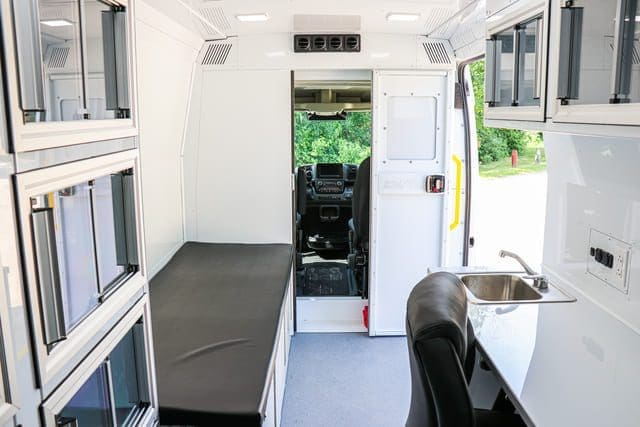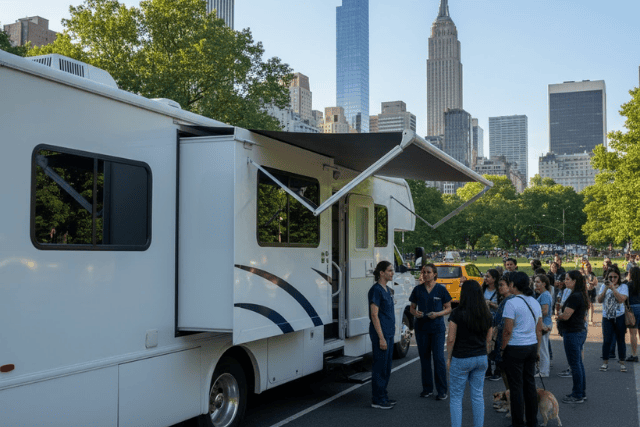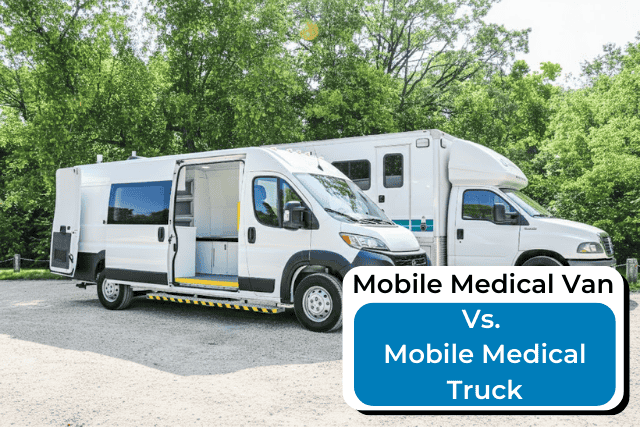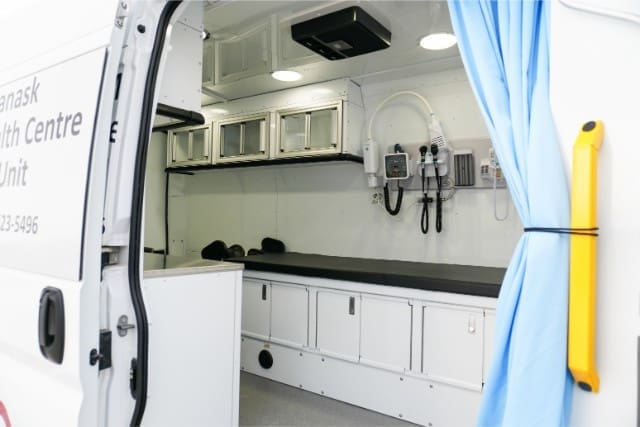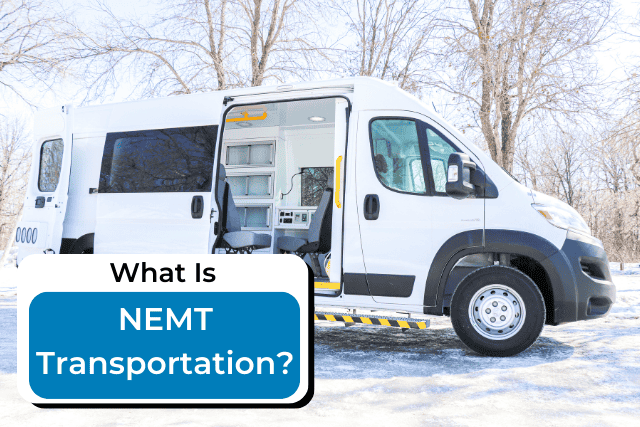Is your organization considering purchasing a mobile medical vehicle, and are you wondering how to ensure the privacy of your patients? Patients will feel uncomfortable discussing their medical issues without the right privacy options. They’ll also feel dissatisfied with their healthcare experience and won’t feel as respected.
Over 92% of patients feel that privacy is a right and that health data shouldn’t be available for everyone to see. This statistic shows the importance of privacy in a mobile medical vehicle.
At AVAN Mobility, we help organizations provide accessible healthcare solutions. We create mobile medical vans to break down barriers faced by people nationwide. We know how important privacy is when it comes to healthcare. That’s why we’ve compiled this article to give you more information on that.
By the end of reading this, you’ll know all about the top 5 ways to ensure privacy in a mobile medical vehicle.
5 ways to ensure privacy in a mobile medical vehicle
When you run a mobile medical vehicle, keeping patient information private is important. People trust you with their health details, and it’s your job to ensure they stay safe. Here are five easy-to-follow ways to make sure your mobile medical vehicle keeps patient information private:
1. Tinted windows and curtains
Why it matters: Tinted windows are like sunglasses for your vehicle. They make it hard for people outside to see what’s going on inside. In this case, we’re referring to the windows that would expose the treatment space, such as the back of the van.
Curtains are like privacy shields. You can open or close them as needed.
How to do it: Consider adding tint to your van’s windows if they don’t include it already. It helps keep the inside of the vehicle concealed. Curtains are a flexible option. You can use them to create private spaces inside the vehicle. Close them for examinations and open them up when you don’t need them.
Why it’s smart: Tinted windows and curtains give you control over privacy. Patients feel safer when their personal information and bodies are kept private, not on display in the mobile medical vehicle for everyone to see.
2. Privacy dividers
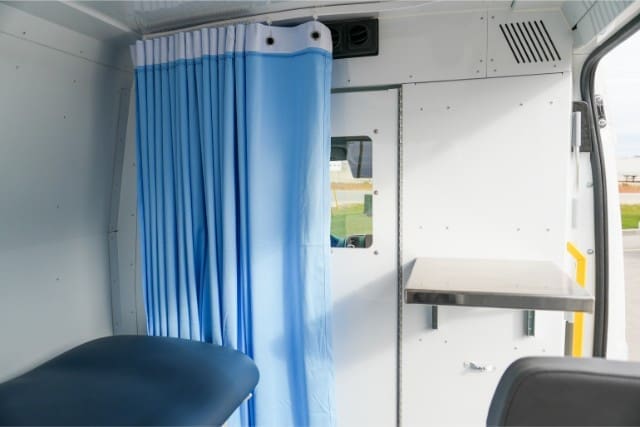
Why it matters: Privacy dividers are like invisible walls. They separate the patient from the clinician. Patients want to feel safe and private during medical visits.
How to do it: If your mobile medical manufacturer has the means to do so, have them install dividers strategically in your vehicle. Place them where they’re needed most. During examinations or discussions, these dividers offer a visual barrier.
Why it’s smart: Dividers help create private spaces, making patients more comfortable. When people feel safe, they’re more likely to share important health information.
3. Use encrypted communication and storage systems
Why it matters: Encryption is like a secret code for patient data. It scrambles information so no one can read it without permission.
How to do it: Choose systems that use encryption for digital patient data. Make sure your communication channels and storage systems are secure. It’s like having a locked vault for patient information.
Why it’s smart: Encrypted systems protect patient data from unauthorized access. Following this step is essential to meet privacy regulations.
4. Follow Standard Operating Procedures for data handling
Why it matters: SOP stands for Standard Operating Procedures. These are the rules of the clinic. They cover how you collect, store, and remove patient data. Handle patient data in your mobile medical vehicle just as carefully as you would in a regular healthcare facility.
How to do it: Create clear procedures for handling patient information. Make sure everyone on your team knows these rules and follows them carefully.
Why it’s smart: Consistency is key. SOPs help everyone stay on the same page. Patients feel more confident knowing their data is handled correctly every time.
5. Data security
Why it matters: Data security is all about keeping patient information safe, both digital and paper records.
How to do it: Use strong passwords and access controls for digital information. This way, only authorized people can access patient data. For paper records, lock them up in cabinets or secure storage areas. Regularly check to ensure everything stays secure. Keep your data transmission secure by using private networks with strong passwords. Private networks ensure that only authorized personnel can access patient information, protecting it from unauthorized access and cyber threats.
If possible, opt for wired connections instead of wireless ones. Wired connections are more secure because they are less susceptible to interception. This choice minimizes the risk of data breaches during data transfer.
Why it’s smart: Data security prevents unauthorized access to patient information. It’s another layer of protection to maintain privacy.
As your organization follows these five steps, you’ll be well on your way to ensuring that your mobile medical vehicle maintains the privacy of patient information. This helps you meet legal requirements and builds trust with your patients, making them feel safe and valued during their healthcare visits.
3 considerations for ensuring privacy in a mobile medical vehicle
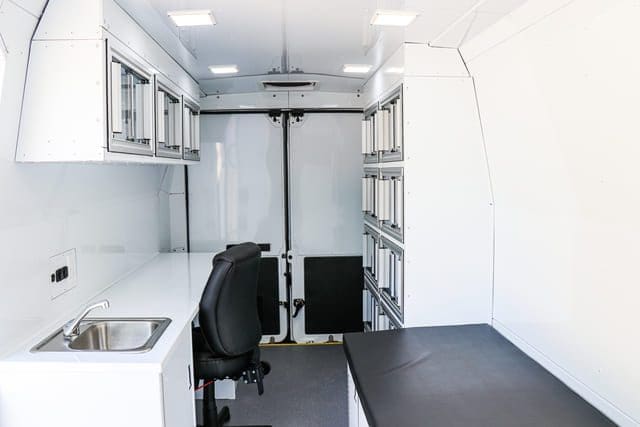
Ensuring privacy in a mobile medical vehicle is important for patient comfort and compliance with healthcare regulations. Here are a few key design considerations to keep in mind:
1. Privacy room size
The size of the private area within your mobile medical vehicle is essential. It should be spacious enough to accommodate patients comfortably while maintaining their privacy. When determining its size, consider the types of medical procedures you’ll perform and the equipment you’ll need in this space.
2. Location matters
Think about where you’ll be using your clinic on wheels. In crowded urban areas like Los Angeles, you’ll need features like tinted windows to shield patients from prying eyes. In rural locations with few people around, you won’t deal with as many people walking past your vehicle.
3. Accessible amenities
Determine what you or your clients need access to within the vehicle. This includes medical supplies, patient records, and sanitation facilities. Ensure everything is within easy reach to maintain efficiency while preserving patient confidentiality.
Where to go from here with AVAN Mobility
You came to this article to learn more about the ways to ensure privacy in a mobile medical vehicle.
At this stage, you might also wonder about other ways to customize a mobile medical vehicle to fit your needs. Read our article on mobile medical van customization for more information.
Moreover, you might be curious about the expenses associated with your mobile medical vehicle. To get a detailed breakdown of the costs involved, we invite you to explore our informative article on “How Much Does a Mobile Medical Unit Cost in the U.S.?.” It provides valuable insights and answers to your financial queries.
Our journey at AVAN Mobility began with a vision to break barriers, and we work with organizations and communities that share our passion for accessibility. If you’re ready to take your services directly to your clients and make primary healthcare accessible for all, reach out to our experts today by clicking the button below.
Our step-by-step process ensures a seamless experience, from discovery to vehicle build and delivery, so you can confidently move forward with us on your mission to improve healthcare accessibility.
FAQ
Q: How does ensuring privacy impact the overall patient experience in a mobile medical vehicle?
A: When patients feel that their personal information and health discussions are kept confidential, they are more likely to open up and share their concerns honestly. Studies have shown that individuals are more comfortable discussing sensitive medical issues when they know their privacy is protected. This contributes to better healthcare outcomes and a positive experience for patients.
Q: Are there ways to make patients feel more comfortable and secure in a mobile medical vehicle?
A: There are 3 ways to make patients feel more comfortable and secure in a mobile medical vehicle.
Try using decor to create a welcoming atmosphere. A comfortable and aesthetically pleasing environment can help reduce anxiety and make patients feel more at ease during their visit.
Another way is to familiarize patients with the space. If patients are new to mobile clinics, take the time to introduce them to the vehicle and explain how everything works. Allow them to ask questions and explore the space. This approach can alleviate any apprehension and make patients feel more comfortable.
Lastly, follow the tips we provided earlier to ensure privacy and to make patients feel secure. When they know their discussions and examinations are confidential, they’re more likely to relax and trust the healthcare professionals.
